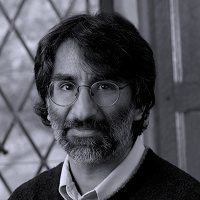The Constitution as originally adopted assumes that there is citizenship of the United States, and of the States, but does not explicitly provide a rule that tells whether anyone is a citizen of either (other than by giving Congress the power to naturalize). Article III, which deals with the judiciary, gives the federal courts jurisdiction over controversies between citizens of different states, and thus assumes that some people have state citizenship. Article II provides that only a natural-born citizen of the United States, or a citizen of the United States at the time of the adoption of the Constitution, may be President, and thus assumes that some people have national citizenship. Nowhere, however, does the original Constitution lay down a clear and comprehensive rule about either kind of citizenship.
Prior to the Civil War, both state and national citizenship were the subjects of considerable controversy. State citizenship was especially important for practical purposes because it gave access to the jurisdiction of the federal courts that was based on diversity of citizenship, and because Article IV secured certain rights to the citizens of one state who were present in another. Different theories of citizenship were developed. One view was that national citizenship was dependent on state citizenship, so that those who were state citizens under state law, and only those people, were citizens of the United States. This view raised a question concerning those born or resident in the District of Columbia, or in a federal territory. Another view was that federal law implicitly provided a rule that identified citizens of the United States, for example the rule of citizenship by birth.
A flashpoint of the controversy over citizenship was the Supreme Court’s decision in 1857 in Dred Scott v. Sandford. Dred Scott, who had been held as a slave, sued the executor of his former master’s estate under the state-citizenship diversity jurisdiction of the federal courts, seeking a determination that he had become free because his master had voluntarily taken him into free territory. Chief Justice Taney concluded that Scott was not a citizen of any state for purposes of the diversity jurisdiction because the Constitution implicitly limited both state and national citizenship on racial grounds, generally excluding individuals like Scott who were of African descent. This and other aspects of Taney’s analysis were strongly disputed by dissenters on the Court and others, who noted that free blacks had in fact been viewed as citizens by many states at the Founding.
The Republican Party strongly opposed Dred Scott, in which the Chief Justice also stated that Congress could not bar slavery from the federal territories. Excluding slavery from the territories was the Republicans’ principal goal, so the Chief Justice had implied that the party was organized for an unconstitutional purpose. Led by Abraham Lincoln, the Republican Party won control of the White House in the election of 1860; and Lincoln’s Administration took the legal position, contra Taney, that free blacks were indeed American citizens. At the end of the Civil War, the Republican Party was in control of the 39th Congress, which started its first session in December 1865, at a time when the former Confederate states had formed new, white-dominated governments that restricted the rights of former slaves. In response to those discriminatory laws (generally referred to as “Black Codes”), Congress passed the Civil Rights Act of 1866, which declared that all persons born or naturalized in the United States were citizens of the United States and the state in which they lived, thereby affirming a rule of citizenship by birth that did not depend on race. The only two textual exceptions to this rule of birthright citizenship were for American-born persons “subject to any foreign power” and for “Indians not taxed.” The Civil Rights Act also provided that all citizens of each state should have the same basic civil rights, including the right to hold property and make contracts, as were enjoyed by white citizens. The statute thus forbade race discrimination among citizens with respect to various legal benefits then called civil rights, but did not dictate the full content of all the rights of citizens. It did not address a distinct category of rights then referred to as “political rights” as contradistinguished from “civil rights.” Voting was a paradigmatic political right. Under widely prevailing views at the time, citizenship alone did not suffice to confer full and equal “political rights.” For example, under the Civil Right Act an American-born minor child or adult woman would clearly be a citizen, but would not therefore be automatically entitled to vote or exercise other “political rights.”
The Fourteenth Amendment as drafted by the Joint Committee on Reconstruction in the spring of 1866 did not explicitly deal with citizenship. The Senate added what is now the first sentence, which grants both national and state citizenship in language quite similar to that of the Civil Rights statute, and the House agreed to the amendment. The basic principle of a federal rule of race-blind citizenship based on birth (and naturalization) was not in much dispute, although there was some debate about the restriction of the grant of citizenship to persons subject to the jurisdiction of the United States.
The Citizenship Clause has given rise to several controversies. Does the grant of citizenship bring with it any particular legal benefits, and if so what are they? Are these benefits, whatever they might be, to be defined and enforced exclusively by courts? Alternatively, does Congress have power to broadly supplement judicially-recognized benefits, thanks to the final sentence of the Fourteenth Amendment, which empowers Congress to “enforce, by appropriate legislation, the provisions of” the Amendment? If there is such a congressional power, does it encompass authority to define rights of citizenship applicable against other private persons? And how should the first sentence’s restriction to persons “subject to the jurisdiction” of the United States be understood? When adopted, that clause, which was drafted against the backdrop of the Civil Rights Act, was clearly understood to withhold birthright citizenship from the American-born children of foreign diplomats present in this country, because under international law diplomats and their families were largely immune from the legal control and the courts of their host country. The limiting clause also was understood not to grant birthright citizenship to various members of Indian tribes whose political relations with the United States limited its authority over the tribes’ members. The scope of the limiting clause is a matter of political controversy today.






